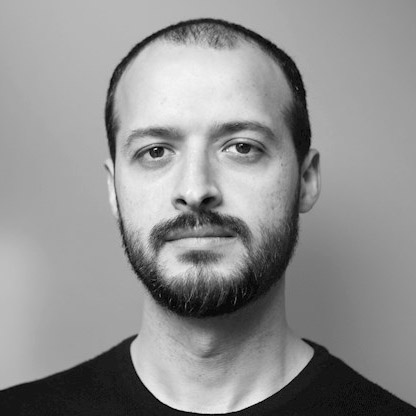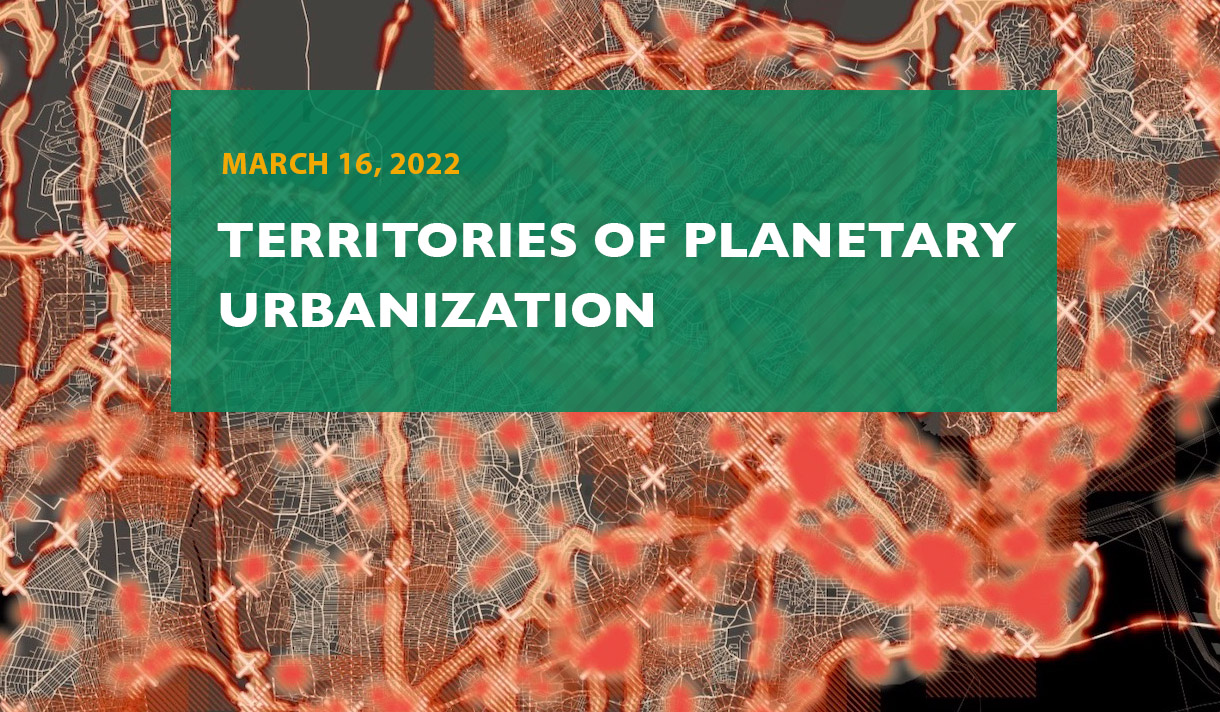Event
Territories of Planetary Urbanization Master of Science in Architecture, Urban Design (MS.AUD) Program
March 16, 2022
6:00 PM – 8:00 PM
The Planetary is understood as ”relating to or belonging to a planet or planets and relating to the earth as a planet.” In the Planetary, many parameters are at stake that reveal not only the singularity of their actions or influences but contrarily, the complete codependency and entanglements of bodies.
In Facing the Planetary, William Connolly expands on the politics of pluralization, capitalism, fragility, and secularism to address the complexities of the Anthropocene. Codependency, coupling, and cause-effect determine the deployment of such systems and their mutual influences. As planetary-scale reproduction occurs, increased levels of anthropogenic mutations exponentially count the homogenization of urban forms and public realms. This condition makes us reflect on the interdependency of such systems that, voluntarily or not, are terraforming the planet. The formation of earth is a process that has taken place over millennia, and as production and reproduction of urbanization continues, must be seen holistically as a process of continuous transformation of the earth-system, inherently and deeply connected with the anthropogenic and resulting from it.
The Territories of Planetary Urbanization event traces new concepts and emerging horizons for different ways to inhabit the planet vis-à-vis current challenges and opportunities that emerge from technological, environmental, and socio-cultural domains.
This event is presented by the Master of Science in Architecture, Urban Design program at New York Institute of Technology School of Architecture and Design.
Moderator:

Marcella Del Signore
Director, M.S. in Architecture, Urban and Regional Design, and Associate Professor, School of Architecture and Design, New York Institute of Technology
Bio
Marcella Del Signore is an architect, urbanist, educator, scholar, and the principal of X-Topia, a design-research practice that explores the intersection of architecture and urbanism with technology and the public, social, and cultural realm. She is an associate professor and director of the Master of Science in Architecture, Urban and Regional Design at NYIT School of Architecture and Design. Her research focuses on interscalar design approaches that engage socio-technical systems through computation, prototyping, material and fabricated assemblies, data-driven protocols, and adaptive environments. She is the author of Urban Machines: Public Space in a Digital Culture (LISTLab, 2018; OROEditions, 2020) and the editor of Data, Matter, Design: Strategies in Computational Design (Routledge, 2020.) In 2018, she co-edited Recalibration: On Imprecision and Infidelity proceedings published during the 2018 ACADIA Conference, where she served as technical co-chair. In 2018, she co-curated the “Data & Matter” exhibition at the ECC during the 2018 Architecture Venice Biennale, and she is currently exhibiting at the 17th Architecture Venice Biennale in 2021.
Speakers

Jeffrey Nesbit
H. Deane Pearce Endowed Chair, College of Architecture, Texas Tech University
Bio
Jeffrey S. Nesbit is an architect and urbanist, and recently received his Doctor of Design degree (DDes) from Harvard University Graduate School of Design. He is a Postdoctoral Research Fellow in the Office for Urbanization at Harvard and Founding Director of the research group Grounding Design. His work focuses on processes of urbanization, infrastructure, and the evolution of “technical lands.” Currently, Nesbit's research examines the 20th-century American spaceport complex at the intersection of architecture, infrastructure, and aerospace history. He has written several journal articles and book chapters on infrastructure, urbanization, and the history of technology, and is co-editor of New Geographies 11 Extraterrestrial (Actar, 2019), Rio de Janeiro: Urban Expansion and Environment (Routledge, 2019), Chasing the City: Models for Extra-Urban Investigations (Routledge, 2018), and host of “Nature of Enclosure,” a podcast series on urbanNext. Nesbit currently holds the prestigious 2021-2022 H. Deane Pearce Endowed Chair at Texas Tech University while previously teaching architecture and urbanism at several institutions, including Harvard University, Northeastern University, University of North Carolina Charlotte, and University of New Mexico.
Well before Soviet cosmonaut Yuri Gagarin became the first human to complete an orbit of the Earth in 1961, experts had considered how humans might escape failed systems in space travel. Renowned rocket engineer, Wernher von Braun envisioned an Emergency Escape Capsule in the early 1950s to protect astronauts in the event of a post-launch emergency. As the bail-out is determined inevitable, the crew initiate the eject button, and, chemical powder would ignite a small charge, forcing the capsule to slide out of its rocket chamber onto rails. Discharged from the abandoned spacecraft, the capsule would then drop back down to Earth with the crew securely enclosed inside. Several cutaway renderings by American commercial illustrator, Fred Freeman, were used to illustrate von Braun’s geographically remote and imaginary scenes of emergency and escape. The drawings included detailed representations of the apparatus, interior, and mechanical systems necessary for a successful ejection. Rendered in full color, the spectacular illustrations depicted von Braun’s military-like capsule escape designs. Crew housed inside the compact capsules seemed to maintain calm expressions and appear to be wearing combat uniforms from World War II—the kind of military field uniforms commonly known in Europe as battledress. This talk suggests these early visions generate a new American aesthetic for how we reach extraterrestrial space, but also anticipate for disaster.

Marina Alberti
Professor, Department of Urban Design & Planning, University of Washington
Bio
Marina Alberti is Professor of Urban and Environmental Planning in the Department of Urban Design and Planning at the University of Washington. She is Director of the Urban Ecology Research Lab and PI of the NSF Funded Research Collaboration Networks on Urban Eco-Evolutionary Dynamics. Her studies focus on the interactions between urban patterns and ecosystem function, urban signatures of evolutionary change, and the properties of cities that enhance their resilience and transformative capacity. She also leads research on urban ecological modeling, scenario planning, and urban ecological metrics to monitor progress and inform policy-making and planning. In her book Cities That Think like Planets (UW Press 2016), Alberti advances a science of cities that work on a planetary scale and link unpredictable dynamics to the potential for socio-ecological innovation.
Cities must rethink themselves in the context of planetary change. What role do cities play in the evolution of Earth? Cities across the globe are changing Earth’s ecosystems by altering fundamental processes that maintain life and support human wellbeing. Cities are not simply driving loss of biodiversity. They are changing the genetic make-up of many populations including animals, plants, fungi, and microorganisms. Changes in species traits might have significant effects on socially-relevant ecosystem functions such as nutrient cycling, pollination, water and air purification, and food production. I propose a co-evolutionary paradigm for building a science of cities that “think like planets,” expanding the time and spatial scales of city design and planning, to include the scales of the geological and biological processes on which our planet operates. The city that thinks like a planet is not built on already set design solutions or planning strategies that are expected to equally apply across the world, regardless of place and time. Instead, such a city will be built on principles that emerge from expanding our scientific understanding, drawing boards, and collaborative action to include both human and planetary processes, to position humanity in the evolution of Earth. Such a view acknowledges the history of the planet in every element or building block of the urban fabric. A city that thinks like a planet is simultaneously resilient and able to change.

Ali Fard
Assistant Professor of Architecture, University of Virginia
Bio
Ali Fard is a researcher, designer, and educator. He is an Assistant Professor at the University of Virginia School of Architecture, and the co-director of Op.N, a design and research collaboration based in Toronto and Charlottesville. Before joining UVA, Ali was a research associate at the Urban Theory Lab at Harvard Graduate School of Design and held teaching positions at the Harvard GSD and University of Waterloo where he was a Lecturer in Architecture and Urbanism. He served on the editorial board of the New Geographies journal from 2013-2018. Ali’s current research investigates the operational landscapes of connectivity, the urban/spatial disposition of information and communication technologies, and the urbanization of cloud computing. His research and design work have appeared in MONU, MAS Context, Bracket, Azure, PLAT, and Harvard Design Magazine. Ali is the co-editor of New Geographies 7: Geographies of Information. (Harvard University Press, 2015) He holds a Doctor of Design (DDes) in architecture and urbanism from Harvard University and a Master of Architecture (M.Arch) from University of Toronto.
As the computational logic of digital platforms begins to dominate urban life, tech corporations are leveraging a planetary geography to exert ever more control over the organization of urban spaces, and to position themselves as powerful actors in bringing about a particular vision of our collective urban future. In this presentation, I examine how the globally expansive operations of technology platforms entails a particular territorial hybridity that puts datadriven control and management of concentrated moments of urbanization in cities, in direct relationship with infrastructural extension and increasing operationalization of the erstwhile non-urban periphery. From sensors to data centers, from smart watches to the informal Cobalt mines of Sub-Saharan Africa, and from high tech campuses to the so-called smart cities dotting the globe, the spatial imprints of data are deeply embroiled in the geopolitics of their host territories, while contributing to the territorial expansion of this planetary operational geography.
